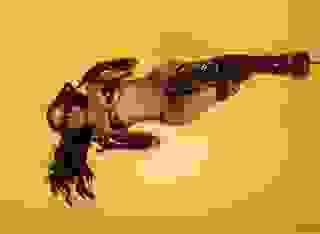Note: You can change font size, font face, and turn on dark mode by clicking the "A" icon tab in the Story Info Box.
You can temporarily switch back to a Classic Literotica® experience during our ongoing public Beta testing. Please consider leaving feedback on issues you experience or suggest improvements.
Click hereIt involved character.
Perhaps the most difficult time was when my parents asked about her life, her work, and her years. I realized the debilitation of her period of recuperation, but they didn't know her story and yet she handled it truthfully if without specifics. She spoke of her recent work, of her family's help and support, of a terrible event that led to it all. My parents didn't pry more.
She looked at me, smiling, and held my arm or my hand.
Mom pulled out ice cream and we each had a bowl as it melted, and it was a wonderful first meeting. Dad was laughing when Maria talked of her dad and her years growing up in Sky Grey. Maria had a tinkling soft laugh, and she had several opportunities to exhibit it, as first Mom and then Dad told childhood stories of my escapades in baseball and tennis. Maria mentioned she was descended from the founders of the town, Grey and his Miami wife, She Who Shines. Actually, she was descended of their adopted white child, One of Peace; she didn't know the truth from the fiction of these ancestors, although her father had a cache of old accounts, diaries, and some stories passed down. That caught my attention and Dad's, because of our interest in local history.
We left with the promise we would be back sooner rather than later. My mother hugged Maria, and Mom and Dad both stood at the door as we walked away in the dark. I held Maria's hand to the car and held the door for her. I got in my side and started the engine.
"Your parents are wonderful."
"You certainly know how to make a good impression," I said. "I wonder sometimes if you are too good to be true."
"I'm just me. In love with you."
"It's a miracle."
At her house we walked onto the porch and I kissed her in our heavy coats in the cold. Kissing goodnight might be the best part of not being married, not being committed, not being ready. Without a sound, I heard music.
Chapter 8: All is Said
Father Michales laid out his plans for my new position when I returned to work the first week of January.
"The board has approved the new office, office, not just position. You will fill the lead position. You will have a secretary to deal with credentials: making sure all transcripts are up to date, that other achievements are fully..." He explained in detail how he wanted the work done, asking my opinion, positing how many others we would need to hire. He had a whole handbook of plans, with suggestions for my consideration on points he considered debatable. It was the booklet he'd presented to the board. "I plagiarized a lot of your reports and ideas from last summer," he said, "and I copied the contractual system at Good Sam in Minneapolis where I used to work..." He wanted to know in detail how the Cleveland program fit in, and I explained about new databases, professional organizations, and contracts. He wanted me to visit all the larger hospitals in the area and discover how they handled things.
The board had established a committee to oversee and advise us. They were writing a step-by-step set-up plan, based on Fr. Michales's booklet and their own expertise (several were on boards at other hospitals, one Dr. Johansen actually ran a similar program for a doctor assignment service). They wanted to meet me.
I was astounded. An office. An assistant, soon probably another. Responsibility for others.
"You may choose your own secretary or assistant, either from those already working for us with his or her consent, or a new hire. It is up to you. I'd like to see the job description you write before you post the position. Your new office is being renovated just above the main entrance. Your title is Deputy Chief Executive for Professional Credentials. You will report to me. You are not superior to the department heads, but you will work with them. They approved this position, and you in it, by the way. They know too many are slipping through the cracks as the hospital grows, not so much because of a failure to maintain licensure but a sense that we are just a stepping stone. They have promised to help you and will not, repeat NOT, be annoyed at any question you might ask. That includes the color of the paint on the walls." He smiled. He meant the department heads would not hold it against me if I asked a silly or ignorant question.
It was a lot to take in. I had not been responsible for others since I was in the Marine Corps. I wondered if all of this was happening because of the shooting. "Father, am I being promoted because of the murders?"
He sat back in his chair, thoughtful. It was serious to him, as if it got to the heart of our sense of value. He steepled his fingers, looking at them as he started, but then at me. "I first brought up the need for a change in this area last April, two months before that day. I even mentioned I thought you would be a good person for the position, but there are some weaknesses in your resume, if I may be frank, most of them having to do with your relative youth. You are 29, almost 30. You'll be dealing with doctors into their seventies. Conceited. Insecure. Critical. Blaming. Your work was good, but you only have a bachelor's degree, and to some of these people that makes you crap. As we discussed the position we decided you would be good in the office, but that you were not ready to run it.
"Then the shooting. Then the revelation of who took down the killers, and most of all, then the fact you were not seen on TV, not heard on the radio, not even interviewed by the news magazines. To the department heads, you rose in their estimation. At this point, I said I was sending you to the Cleveland Program and maintaining your salary here. They agreed. They know you are not shy, not reticent, but you are friendly and never say a bad word about anybody. They know you have had offers to tell your story, some of them for money. They reconsidered you.
"It's not the killing that got you this position, but how you handled it. They came to trust you. At the last meeting they were unanimous about creating the position, putting you in it, and getting it up and running as soon as we can. I ordered an office renovated; I want it to be hard for doctors to avoid you, as often happens where credential updating is involved, so your office is front and center near the hub."
"I am very happy, Father. I will need advice..."
"I'm here. Phil can even give you some. The supervisory committee can help, Dr. Johansen can help. Every department head. They all know you. They can be ambitious and manipulative... so the humility you assume might help. I doubt they understand it, and it's not in their nature to think deeply about the character of an administrator." He smiled at that.
"I'm nervous, now. Thank you, sir. I will..."
He interrupted. "Don't you want to know the salary?" He paused. "I can definitely say they will NOT understand you." He told me the number, and I realized I was going to have a future in Sky Grey.
I went to my new wreck of an office. Construction mess was everywhere. The builders looked at me as if I were intruding in their dust, so I soon made my way to another part of the building.
*
Late that afternoon, I received a phone call and promptly broke Father Michales's confidence. I accepted an interview.
"Hello?"
"Uh, I'm trying to reach John Buck," someone said. The voice was male, young, and familiar.
"I am he." I don't like to talk on the phone. I see it as necessary to make appointments and to woo women, but otherwise without much benefit to society.
"This is Tony Spagnol, Mr. Buck. I was the kid..."
"Tony! What a surprise to hear from you. How did you get my number?"
"I called the hospital and they put me through to Father Mike. He said you wouldn't mind. Anyway, Mr. Buck, I have a favor to ask. Uh, I have a friend and she's working for the school newspaper. She said it would be quite a scoop to get an interview with you since you haven't given any. She's interviewed me and Mom, but we've done like a dozen; I was even on CNN once." He sounded impressed with himself. I could understand the importance he must have garnered by almost being killed in a massacre.
He went on. "So she asked me to ask you if you'd do an interview with her."
Would it sacrifice anything if a school reporter got the first interview? By now I had no requests coming in. There had been enough bombings and threats that Merciful Lord was background information for those who lost no one, who knew no one, or who were not crippled or hurt.
"Give her my number and tell her to call me," I said noncommittally.
"When would you like her to call?" he said.
"Anytime. Tell her now, okay?" I laughed. "Good hearing from you, Tony. Give my best to Marilyn and Cal."
"Sure, Mr. Buck. Bye." I heard him whispering as he hung up. He should have just handed her the phone. Which he did: her call came right away from the same number. I was enjoying this.
"Hello."
"Mr. Buck? This is Susan Daggers. I'm a reporter for the Clark High School Gazette. I was hoping and I know Tony told you I'd like to do an interview with you about the Merciful Lord Hospital Shooting. Would you consider that, sir?"
"Are you a good reporter, Ms. Daggers?" I inquired.
"I'm learning. I think I've written some good stories about crime near the high school and some kids who got in trouble. Although the advisor wouldn't print the one about the gang beatings. I say what's true to the best of my ability."
"Is this a what happened piece, or a commentary of some kind?"
"What happened. I read some police interviews about you but I found them confusing."
"You read them, huh?" So the kid actually worked before I'd agreed to the interview. "They interviewed me in pieces, several times, and so their reports were disjointed, I think," I said. "You may interview me. Can you come to the hospital? I can show you where I was and where things happened."
I heard a celebration at the other end. She thought this was her big break, I guess. I smiled. To be 15 again...
"Can I come Saturday? That way I won't miss school. In the morning would be best, I have a basketball game in the late afternoon."
"How about nine in the morning? You can bring a camera if you want. No pictures of me. You can record audio though."
"Great!! This is great!! Thank you so much, Mr. Buck. Nine Saturday. I'll be there." We hung up. I'd forgotten that enthusiasm in youth.
Saturday, she was right on time. I saw her enter and go straight to the information desk and ask for me. Jody was back after so many months and saw me approaching.
"You must be the reporter, Susan Daggers," I said to the kid. She was a taller black girl with her hair in cornrows. She wore a dark pantsuit, low-heeled shoes, and carried a notebook and a small recording device. Jody could hear every word.
Susan turned and smiled at me. "You look just like your picture," she said.
"I've avoided photographers, but some have gotten me so I don't know which one you mean. Would you like to talk to me in my office? Better yet, I'll take you around the hospital, show you where things happened. You can take pictures; I'd rather you not take any of me. There might be a crackpot out for revenge or to make a name for himself. I want as few pictures of me out there as possible. Okay?"
She said, "I'm a little disappointed about the picture of you, but I understand you're protecting yourself. So where did things happen?"
"Sort of right here." I looked at Jody. "Have you given any interviews?"
She said, "I was mentioned in some stories, but just a line here and there. I thought you didn't give interviews?"
"Only when I'm sure it's a good cause."
Jody smiled, nodding.
Susan: "Were you involved in the shooting, ma'am?"
Jody: "Lost part of my spleen when I got shot in the stomach."
Susan hesitated with surprise, I thought.
"A lot of people here were involved, and there are some still in great mourning. We need to be discreet," I said. She nodded. "The shooters came in there, and started shooting everyone, Jody one of the first."
So I showed her where the shootings were, and where I was. I walked her through my actions: pushing doctors into the classroom, finding Tommy's pistol and ammunition, following the bodies to the cafeteria. She took pictures of all the different spots, especially the waiting room where several were hurt and killed. I detailed what I saw and did in the cafeteria. "Tony was right here," I pointed, "and one of the killers had his left arm around his neck with his rifle sort of pointing at the security guards across the room. Mrs. Spagnol was here," I pointed again, "and her guy had his left arm around her neck and his pistol in his right hand pointed at her temple. His rifle was on the floor; it may have jammed or he needed to reload and didn't have time when the security guys arrived.
"I signaled to the guards from here, I stepped forward and shot Mrs. Spagnol's guy as I knocked his pistol away. The bullet went through his head and hit my hand," I said, holding up my hand, "and then I stepped over to Tony's guy and shot him. He was looking right at me by then and I shot him under his eye. They both fell, Tony and his mom were okay, and it was over."
I showed her my right palm with its angry scar.
"Wild," she said. "I read you used to be a Marine. Did that help you in your actions?"
"The Marines taught me to assess the situation and then act. Once I saw I could affect the situation positively, and I had a good chance to save some people and survive myself, I moved. I think I was only behind the killers maybe ten seconds before I shot them. It was quick. Luckily, they were in an awkward position with the hostages and security guards."
"What happened to the guy you took the pistol from?"
"He was already... gone. I came across Jody. She was shot and down, right where you saw her, upset, wondering if she was going to die. I remember I said, "I hope not" or something like that. She told me she thought there were only two guys."
"You were married when this happened?"
"Yes. We're divorced now. Shortly after the shooting, actually."
"Was she relieved to find out you were not seriously wounded?"
"I think she was. She assumed I was a bad shot since I shot myself in the hand. I like that way of looking at it, too."
"Did the incident have anything to do with your divorce?" she asked. Hm. Was she really just 15?
"You do have a future in journalism, Sue," I said and took a deep breath. "Yes. It revealed to us both that we shouldn't remain married. It was heartbreaking. The worst moment of my life both at the hospital and at home."
"Why don't you give interviews, until now?" she asked.
"Because it feeds on it. One killer inspires another. A killing here and there, a massacre, a jihad... It was the worst moment of my life. It ended so many lives. I don't want to remember it. I tell you because I want it to be over."
Susan was a delight. We had some ice cream from the machine in the cafeteria and sat there talking about that day, who lived and died, what it seemed to be about. Then she asked if it had changed my attitude toward life.
"It's like anything else. People think I handled a bad situation well. Good, because a million things could have gone differently and worse. I had nightmares some nights, but it was not like it could have been. I was very sure I was doing something to help, and with that assurance I have peace of mind."
Two hours had passed. Her mother was due to pick her up. "You have a basketball game?"
"Yeah, we're playing Merciful Saviour here in Sky Grey. At four."
"Maybe I'll make it. My girlfriend went to Saviour. I'd like to read your story, get a copy of the paper. If I may?"
"I'll send you one, or just drop it off. I go right by here a lot. Mom works down the street. She's a lawyer. It should be in on Friday. Oh, here's my mom now," she said and stood up. I stood. Her mother was also tall, quite elegant, graceful. A pretty woman dressed quite professionally, probably her daughter's model in that regard.
"Ms. Daggers, we were just finishing up. I'm John Buck," I said as we shook hands. She had a very big smile.
"My daughter thinks it's quite a coup to get an interview with you, Mr. Buck."
"She twisted my arm; she figured I'd do anything for Tony, so she got him to call."
She laughed lightly. "Tony has a crush on her."
I smiled and looked at Susan. "So we know he has good judgment." They smiled and soon we said good-bye.
I warned Father Mike about the interview. He thought it was the best way to defuse any lingering interest in my part of the incident. He laughed. "High school paper? Tony's? Good choice!"
I called Maria and asked if she'd like to go to the basketball game at her old school. She said of course, no, well, maybe or rather not, okay. So a little before four we found ourselves climbing into the stands to watch Merciful Saviour play George Rogers Clark. The bleachers were full of fans from the two schools this Saturday. We stayed on the Merciful Saviour side of the stands, but Ms. Daggers saw us and waved to me. Maria saw several people she knew and said hi. We found seats and I pointed out Susan to Maria.
"She's tall."
"Yes. You played basketball?"
"I did until I found out it's a tall girl's game. The women in my family are always short so we were encouraged to play short games, like softball or soccer or lacrosse. Field hockey, also. Not volleyball much, or basketball."
"I was a third baseman in hardball. Not that talented, but I could hit, and I had a decent arm for the throw to first. I sat the bench in basketball in high school."
Maria smiled in that way of all women who know a man wants to impress them with every act, throwing a ball, opening a jar, fixing a car, anything.
"Really!" I said. Maria had a smile.
It was fun. Susan turned out to be a marvelous forward. Saviour lost the game on a free throw by a Clark guard. Maria was rooting for her alma mater, so I tried not to feel too much joy for Susan's win. When you only know one kid in a game, it draws your allegiance. Game over, Maria and I talked to a few of her acquaintances, and I introduced Susan's mother to her while the teams changed clothes or gathered things up.
I think Maria liked being at her old school. She'd been apprehensive, but seeing old acquaintances stimulated her. She was laughing and joking and yelling at good and bad plays for most of the game. Quiet, taciturn Maria became incensed over a block/charge call! I looked at her, her face flaming red like her hair, all littleness of her looking for justice, standing and demanding. I pitied the referee. Maria hit me on the shoulder when she saw me smiling as she sat down.
I saw the Maria she was still inside, that woman who came down the steps at her house and forbade me to leave. Wow again.
Susan's story came out Friday. I found a copy of the paper in my box at work late that afternoon. Its headline was, "The Saviour of Our Merciful Lord Hospital." It was mentioned on Fox and CNN, MSNBC and others. "Saviour" with the u in the Sky Grey tradition became my moniker, and so I smiled and shook my head: nicknamed by a kid in her school paper. She was interviewed on several systems—Fox and MSNBC—and said, "He doesn't want it to inspire a bigger tragedy. He says it was the worst day of his life." Susan was famous in her own way. Good for her.
Of all the stories penned about me, all the reports that identified and pictured me on all the TV shows, it was an interview by Susan Daggers that motivated a certain deeply hidden member of the IWC to action. He saw her on CNN and recorded it, Homeland Security later discovered. He was in no hurry but he knew what he wanted to do, and he wanted to do it to the infidel Saviour. He had a job, no one realized he was illegal, and he had just contacted an old friend through the internet, surreptitiously, of course. The friend was not IWC, but word got around. Yasin was still loose in America.








